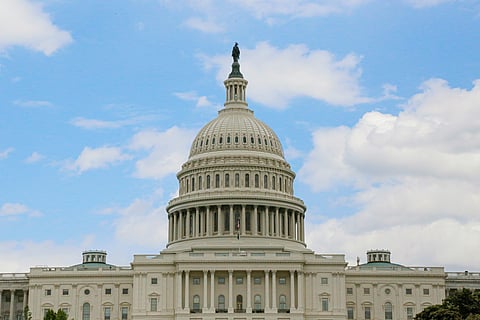

The United States' national debt has exceeded $38 trillion for the first time, reaching $38,019,813 as reported by the Department of the Treasury on Wednesday.
This figure represents roughly $111,000 per person in the country and equals the combined economic output of China, India, Japan, Germany, and the United Kingdom.
The rapid escalation marks the fastest accumulation of $1 trillion in debt outside the COVID-19 pandemic period, following the $37 trillion threshold crossed in mid-August.
Just two months prior, the debt surpassed $37 trillion, with earlier milestones at $36 trillion in November 2024 and $35 trillion in July 2024.
The increase underscores the widening gap between federal spending and revenues in the world's largest economy.
Experts warn that the trajectory poses significant risks to future economic stability.
The Peter G. Peterson Foundation highlighted that interest costs on the debt, which totaled $4 trillion over the past decade, are projected to reach $14 trillion in the next ten years.
These rising expenses are crowding out investments in public and private sectors, potentially harming overall growth.
Credit rating agencies have responded critically, with Moody's downgrading the U.S. government's rating from Aaa to Aa1 in May due to persistent large annual fiscal deficits and growing interest burdens.
Similar actions were taken by Fitch in 2023 and Standard & Poor's in 2011.
Economists at the Penn Wharton Budget Model estimate that financial markets may not sustain debt levels above 200 percent of gross domestic product.
The Congressional Budget Office projects the debt could hit that level by 2047, exacerbated by tax cuts in President Donald Trump's One Big Beautiful Bill Act.
Kent Smetters of the Penn Wharton Budget Model noted that unchecked debt growth could lead to higher inflation, eroding Americans' purchasing power.
The Government Accountability Office points to broader effects, including elevated borrowing costs for mortgages and vehicles, reduced wages due to diminished business investment, and pricier goods and services.
The Joint Economic Committee calculates the debt has increased by $69,713.82 per second over the past year.
The Trump administration maintains that its policies are curbing the deficit's expansion.
Treasury Secretary Scott Bessent announced that the cumulative deficit from April to September stood at $468 billion, the lowest since 2019.
White House spokesman Kush Desai stated that President Trump has reduced the deficit by $350 billion compared to the same period in 2024 through spending cuts and revenue boosts.
The administration plans to further address the issue via economic growth, lower inflation, tariff revenues, reduced borrowing costs, and elimination of waste, fraud, and abuse.
Despite these efforts, Michael A. Peterson, CEO of the Peter G. Peterson Foundation, criticized lawmakers for failing basic fiscal duties.
He described the ongoing approach as budgeting by crisis, urging adoption of responsible reforms to secure a stronger fiscal future.
The milestone coincides with a federal government shutdown, amplifying concerns over governance amid fiscal pressures.